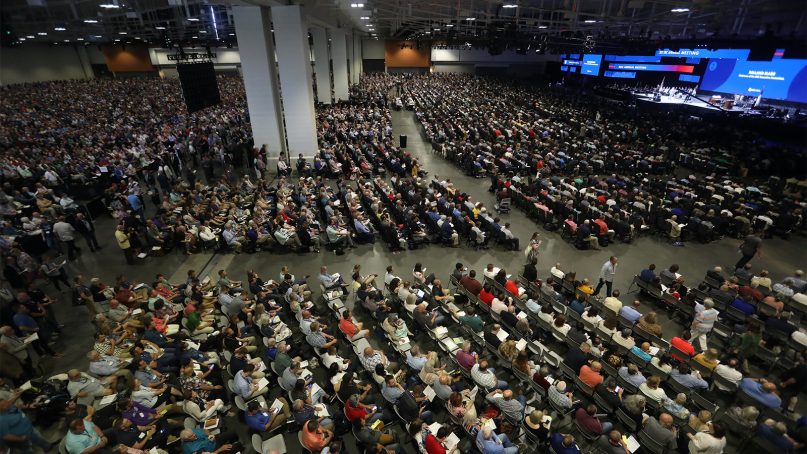(RNS) — The annual meeting of the Southern Baptist Convention begins Tuesday (June 15) with more than 17,000 “messengers” arriving in Nashville, Tennessee, to chart the future of the largest Protestant denomination in the U.S. This year’s meeting, the first since 2019 due to COVID-19, has riveted national attention as the Southern Baptists face decisions on race, gender and sexual abuse.
Here’s a guide to what’s at stake in Nashville and how the Southern Baptists got there:
As a conservative groundswell took shape in the convention in 2019, Albert Mohler, president of Southern Baptist Theological Seminary, emerged as a front-runner presidential candidate to succeed J.D. Greear, a North Carolina pastor. A conservative icon for decades, Mohler may be hoping to draw votes away from the hard right while appealing to moderates as a unifier.
Mohler, prominent Southern Baptist, will be nominated to lead denomination
But facing a yearslong decline, falling revenues and unfinished conversations on racial reconciliation and how to deal with sexual abuse claims in a decentralized denomination, Southern Baptists are increasingly fractured.
Southern Baptist decline continues, denomination has lost more than 2 million members since 2006
In May 2020, George Floyd’s murder in Minneapolis kicked off a summer of protests for racial justice, focused on systemic bias. In September, as the U.S. presidential race headed for its conclusion, President Donald Trump mounted a counterattack on diversity training and academic ideas about racism, including critical race theory.
In November, the heads of the SBC’s six seminaries, including Mohler, released a statement saying CRT is incompatible with the denomination’s central statement of faith.
Southern Baptist seminary presidents nix critical race theory
The statement, which contravened a moderate measure about CRT passed by the SBC in 2019, resulted in the departure of two prominent Black pastors, including Chicago’s Charlie Dates and Ralph D. West. A third, Dwight McKissic, left the Texas Baptist Convention and has since said his continued affiliation with the SBC will be contingent on decisions made in Nashville.
In January, Ed Litton, who has made headway in the denomination on racial justice, entered the presidential race.
Alabama pastor Ed Litton, known for racial reconciliation work, joins SBC presidential race
Meanwhile, the conservative insurgents, now organized as the Conservative Baptist Network, became increasingly vocal both in their criticism of CRT and in their support for complementarianism — a doctrine that confers on men a dominant role in their households and at church, with women forbidden ordination or even the right to teach Scripture where men are present. Mike Stone, a vocal CRT critic and part of the CBN, became the third major nominee for the SBC presidency.
In December of last year, Beth Moore, a popular Bible teacher who has been accused of treading the line on speaking to mixed gender audiences, pushed back on Southern Baptist leaders and their allegiance to Trump.
Then in March 2021, Moore announced in an interview with Religion News Service that she was leaving the SBC, citing support for Trump, racism and a lack of action against sex abuse as reasons for her departure.
Bible teacher Beth Moore, splitting with Lifeway, says, ‘I am no longer a Southern Baptist’
On Mother’s Day, as Southern Baptist leaders looked forward to the annual meeting, Saddleback Community Church in California, home of popular pastor Rick Warren and the SBC’s second largest church, ordained three women as assistant pastors.
Saddleback ordains 3 women, leading to another Mother’s Day dust-up over women pastors
Three weeks later, an impassioned letter written by the long embattled chief ethicist of the SBC, Russell Moore, was leaked to Religion News Service less than a month after he had resigned. Penned a year before, the letter explained his growing alienation from fellow SBC leaders over race and sexual abuse issues, returning those topics to center stage with two weeks to go before the opening gavel.
Leaked Russell Moore letter blasts SBC conservatives, sheds light on his resignation
The bombshell letter — followed by a second letter, to President Greear, and audio corroborating several of Moore’s accusations — left SBC leadership little choice but to announce a third-party inquiry to investigate its handling of sexual abuse.
But on the eve of the annual meeting, SBC insiders and sexual abuse survivors pushed for a wider-ranging, more transparent inquiry. When a motion before the SBC’s Executive Committee on Monday to that effect failed, its supporters vowed to bring the matter to the meeting floor for the messengers to decide.
SBC Executive Committee rejects request for system-wide abuse inquiry





